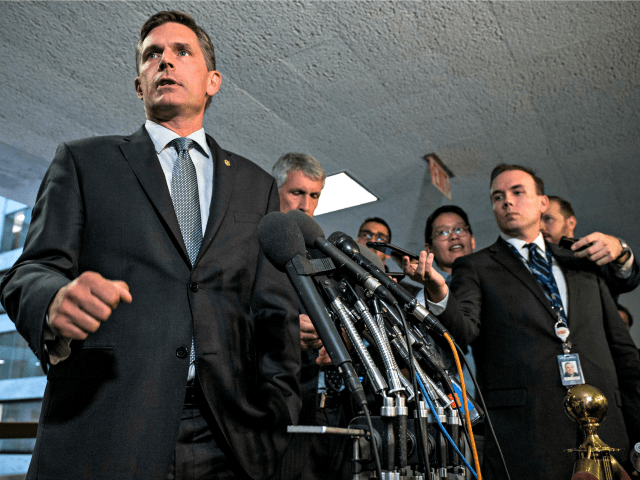The intelligence community between May 2018 and August 2019 secretly eliminated a requirement that whistleblowers provide direct, first-hand knowledge of alleged wrongdoings, according to a bombshell report on Friday by The Federalist.
The report by The Federalist’s Sean Davis raises questions about the intelligence community’s role amid a whistleblower complaint submitted against President Trump in August 2019, alleging he acted improperly when asking the president of Ukraine to assist in investigations into the origins of the Russia collusion allegations and alleged wrongdoing by Joe Biden’s son Hunter Biden.
Davis’s report said a new whistleblower complaint form did not require potential whistleblowers who wish to have their concerns expedited to Congress to have direct, first-hand knowledge of the alleged wrongdoing they are reporting.
The new version of the whistleblower complaint form allowed employees to file complaints even if they have zero direct knowledge of underlying evidence and only “heard about” wrongdoing from others, according to Davis’s report.
According to Davis, a previous version of the whistleblower complaint form declared that any complaint must contain only first-hand knowledge of alleged wrongdoing and that complaints that provide only hearsay, rumor, or gossip would be rejected.
The whistleblower complaint against Trump, which was filed August 12, 2010, alleged Trump broke the law during a phone call with Ukrainian President Volodymyr Zelensky but acknowledged that the person making the complaint was “not a direct witness” to the wrongdoing he claimed Trump had committed.
“The [Intelligence Community Inspector General] cannot transmit information via the [Intelligence Community Whistleblower Protection Act] based on an employee’s second-hand knowledge of wrongdoing,” the form had previously stated under the bolded heading “FIRST-HAND INFORMATION REQUIRED.” “This includes information received from another person, such as when an employee informs you that he/she witnessed some type of wrongdoing.”
“If you think that wrongdoing took place, but can provide nothing more than second-hand or unsubstantiated assertions, [the Intelligence Community Inspector General] will not be able to process the complaint or information for submission as an ICWPA,” the previous form said.
As Davis noted in his report:
The Ukraine call complaint against Trump is riddled not with evidence directly witnessed by the complainant, but with repeated references to what anonymous officials allegedly told the complainant: “I have received information from multiple U.S. Government officials,” “officials have informed me,” “officials with direct knowledge of the call informed me,” “the White House officials who told me this information,” “I was told by White House officials,” “the officials I spoke with,” “I was told that a State Department official,” “I learned from multiple U.S. officials,” “One White House official described this act,” “Based on multiple readouts of these meetings recounted to me,” “I also learned from multiple U.S. officials,” “The U.S. officials characterized this meeting,” “multiple U.S. officials told me,” “I learned from U.S. officials,” “I also learned from a U.S. official,” “several U.S. officials told me,” “I heard from multiple U.S. officials,” and “multiple U.S. officials told me.”
Davis added:
The repeated references to information the so-called whistleblower never witnessed clearly run afoul of the original ICIG requirements for “urgent concern” submissions. The change to the ‘urgent concern’ submission form was first highlighted on Twitter by researcher Stephen McIntyre.
The complaint filed against Trump, in addition to using second-hand sources, cites news articles as proof for many of the allegations.
The complaint also makes a number of false accusations against Trump that have been debunked by the transcript the White House released of a call between Trump and Zelensky.
For example, the complaint alleged Trump demanded that Ukraine physically return multiple servers potentially related to ongoing investigations of foreign interference in the 2016 elections, but such a request was not made.
The complaint also falsely alleged that Trump told Zelensky that he should keep the current prosecutor general at the time, Yuriy Lutsenko, in his current position in the country, but Trump also did not make such a request.
The Justice Department’s Office of Legal Counsel found the complaint to be deficient and not required to be submitted to Congress: “The complaint does not arise in connection with the operation of any U.S. government intelligence activity, and the alleged misconduct does not involve any member of the intelligence community. Rather, the complaint arises out of a confidential diplomatic communication between the President and a foreign leader that the intelligence-community complainant received secondhand. The question is whether such a complaint falls within the statutory definition of ‘urgent concern’ that the law requires the DNI to forward to the intelligence committees. We conclude that it does not.”

COMMENTS
Please let us know if you're having issues with commenting.